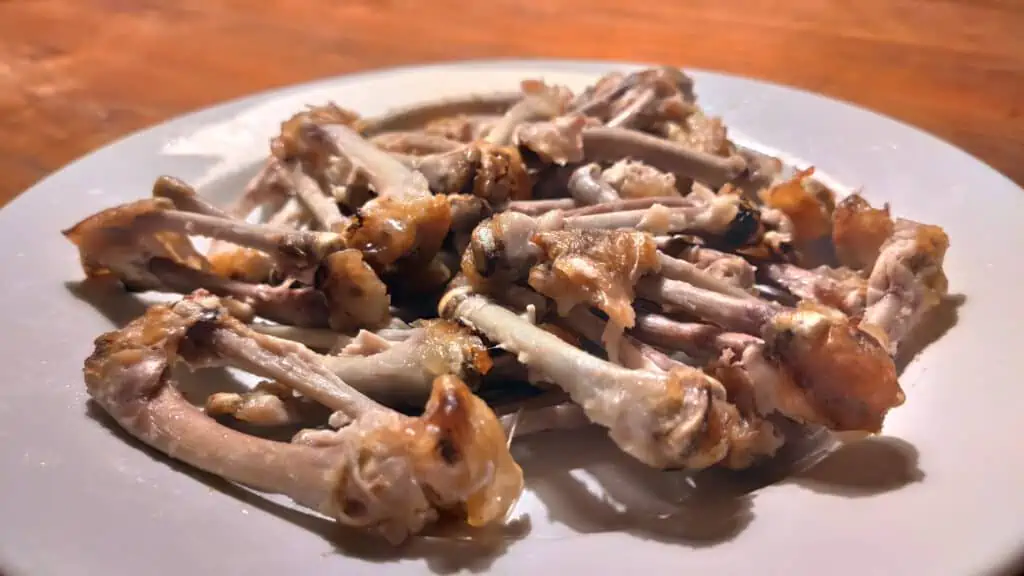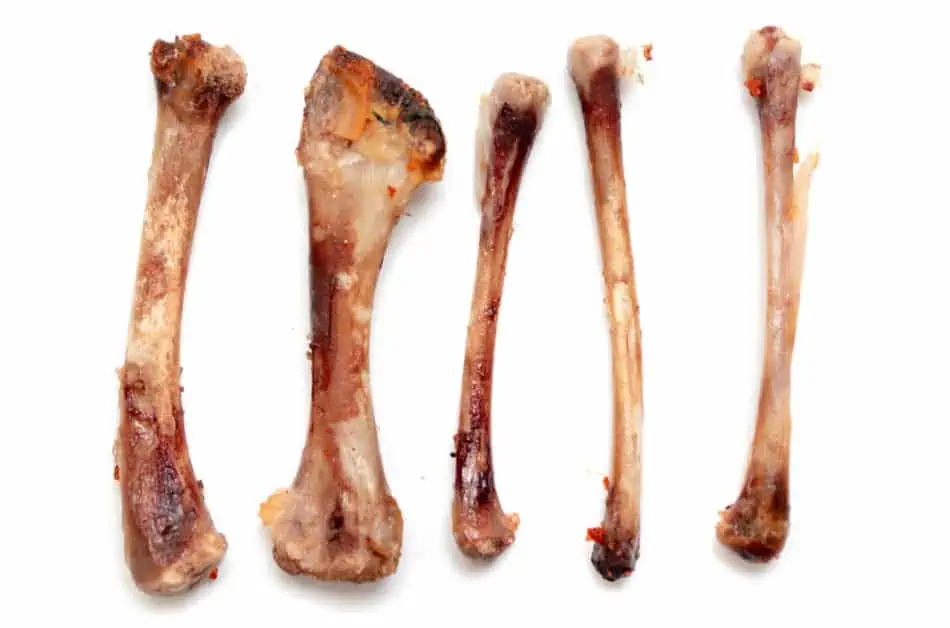As an Amazon Associate I earn from qualifying purchases.
When I first got into composting I wanted to throw everything I could find into our tumbler…and I did. I kept our “compost” moist, turned it regularly, and even added a compost accelerator. It was about that time that I learned that just because something is “food-waste” and came out of my kitchen doesn’t mean it can be composted. Obviously.
After my poorly thought out experiences (and a bunch of time sifting out the uncompostable stuff from our tumbler) I decided that, before adding something to our number, I would figure out a number of things:
- Does it break down easily/quickly?
- Is it beneficial for the compost/my soil?
- What can I do to make it more compostable?
Applying these criteria to the composting of chicken bones took a good deal more research than I expected. People just don’t seem quite as interested as I am in composting each and every little thing (although if you’re here I assume we share the interest….)
Chicken and other poultry bones can be composted. They will break down in a well-kempt compost pile in as little as 60 days. To speed up the composting process, grind the chicken bones or break them down manually before adding them to your compost.
But then the question becomes, is it worth it to compost chicken bones? If they don’t add much to my soil maybe I’m just better off sending them to a landfill and letting them break down there.
Should You Add Chicken Bones To Your Compost?
Nearly every composting guide on the net has a blanket ban against composting meat and dairy. This, in general, is for the sake of simplicity. Both meat and dairy can be composted if done correctly. In fact, many people have successfully composted whole carcasses.
There are three main arguments against composting bones:
- Pests. Decomposing animal products attract scavengers and bones are no different. If you just throw some meaty bones onto your pile you can expect rats, raccoons, or even bears to turn up.
- Smell. Good compost doesn’t really have a smell. Rotting meat, on the other hand, smells terrible. Your neighbors don’t want to smell your rotting chicken dinner.
- Disease. Decomposing meat has pathogens that could potentially be harmful to humans and/or plants. The solution here is to remove all meat from the bones before composting, don’t compost bones in cold compost piles, and don’t eat your compost.
Give that there are several points against composting bones, there must be some compelling pros or I wouldn’t have written this article. First off, chicken bones are among the easiest bones to break down in compost and are among the least likely ingredients to suffer from those problems. So what do they actually add to your compost?
Bones, in general, are made of collagen (a structural protein) and calcium phosphate (what provides the hard structure). Collagen is the main component of connective tissue in mammals (and chickens in this case). It is made up of amino acids (proline, glycine, arginine, and hydroxyproline). These, in turn, break down into carbon, oxygen, and hydrogen. While this can be beneficial for both your compost pile and solid, don’t expect composting chicken bones for the collagen to be a significant boon for your pile
The second major components of chicken bones, calcium, and phosphorus are a different story. While it is entirely possible to find alternate sources of amino acids for your pile, these nutrients are available in high quantities in chicken bones and are extremely beneficial for plants.
Phosphorus is absolutely vital in plant growth. Plants require phosphorus to create ATP, the energy source they make during photosynthesis. Without it, no growth and no plants. As for calcium, plants rely on it for the growth and integrity of their cell walls. Weak cell water leads to diseased plants.
So, in the end, composting chicken bones is a worthwhile endeavor. At least it is for me. If you agree, let’s take a look at some of the most effective ways of doing so:
How To Compost Chicken Bones In A Pile
If you compost in a tumbler or hot compost pile you can feel reasonably safe adding chicken bones without many issues, providing you follow some good general practices. Due to their hollow and splintery nature, chicken bones are among the soften and easiest bones in the animal kingdom to break down. However, this means they also post a problem for pets that can mostly check them up and end up with shards of bone in their guts.
So to avoid all the traditional problems with bone composting, here are the four steps you should take before adding chicken bones to your compost:
1. Harvest And Clean Cooked Chicken Bones

Cooked bones are much easier to break down. While you can use raw bones you’re better off boiling them before continuing. If you’re worried about losing nutrients, you can add the boiled water to your compost pile as well.
2. Dry The Bones
Letting the bones sit out (inside) and dry can take a day or two. If you are in a hurry, dry them in the oven on low heat (200 degrees for a couple of hours should do it) or let them sit in the sun.
3. Break Down The Bones
Chicken bones decompose very slowly because of their structure and lack of surface area. Increasing the surface area by breaking up the bones gives much more surface for your microbes to work on. This can be as simple as smashing the bones with a rock/hammer or as though as turning them into powder in a grinder or food processor. The smaller the pieces of bone you add the more quickly it will break down into plant food.
4. Add The “bone-pieces” To Your Compost
Make your deposit in the middle of the pile where it’s the hottest and be sure to cover your bone fragments to deter scavengers.
5. Continue Composting As Usual
When you turn your pile, keep an eye out for any bone fragments. If your compost appears ready but still has pieces of bone these can be sifted out and either discarded (if you give up) or added to your next pile to continue their journey.
If you follow those steps, chicken bones can break down even faster than 60 days.
In fact, if you take your bones all the way to powder they can actually be added directly to your soil or plants (typically in water) as a natural fertilizer.
Compost Chicken Bones In Bokashi-Style Compost
The more common method of composting bones is by utilizing a Bokashi Style system. A typical “batch” of Bokashi soil takes 4-6 weeks however and it is unlikely that bones you added whole with break down in this time.
This leaves you with two options: add the finished bokashi compost to your garden with bone fragments and just accept that you’ll be digging them up for months/years to come, or process the bones like you were adding them to a compost pile/tumbler before adding them to your bucket/bin.
One of the main advantages of composting chicken bones in a bokashi system is that you don’t need to thoroughly clean them before adding (although doing so can make it easier for you to crush/grind them). In fact, you can throw your whole leftover chicken into your Bokashi Bucket and the anaerobic bacteria will kill the pathogens and break down the meat/bones safely with no smell.
As an added benefit, the pickling/fermenting process is not attractive to scavengers so it’s very unlikely that they will be attracted to the bones, even if you add hunks of them to your garden.
If I were to use a Bokashi Bucket to compost chicken bones I would first break them up. After 4-6 weeks I would sift my compost and add any large bone chunks to my compost tumbler or pile instead of putting them in my garden.
Conclusion
So yes, you can compost chicken bones and yes, it is worth it! The nutrients they add to your soil and the added benefits of producing zero waste mean that, in my mind, you should compost every single beneficial thing that you can. So, if you’re vegan, I wouldn’t go seeking out chicken bones to add but, if you have some on hand, throw them in!




